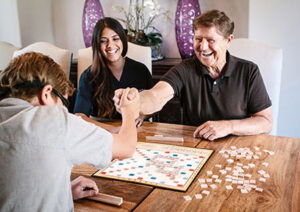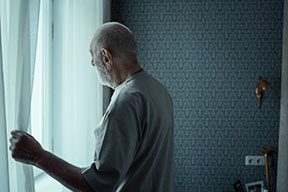Dealing with the loss of a loved one, especially a spouse, is unarguably one of the most difficult aspects of the human experience. The experience can be particularly heart-wrenching for seniors, as they often confront a host of other uncertainties at this point of their lives.
AARP estimates that abut 40 percent of women and 13 percent of men who are 65 and older are widowed. About 7% of older adults develop the syndrome of complicated grief in which they experience a prolonged mourning process and an acute grief that affects mental and physical health.
The family caregiver’s journey often begins by helping a spouse manage age-related chronic conditions or recover from surgery. With escalating care needs, the spouse providing personal care may turn to respite options such as adult daycare services or contracting a professional caregiver through a reputable in-home care agency like Amada Senior Care. Eventually, the transition to assisted living facilities, memory care units, or possibly nursing homes might be necessary for everyone’s welfare. Through the various stages of care, the caregiving spouse continues as a constant source of assistance by managing care needs, regularly visiting, and serving as an advocate for a loved one.
Despite how challenging or stressful family caregiving turns out to be, a spouse might feel a sense of loss once this role inevitably concludes. This inherent grief might sometimes be coupled with a feeling of relief, particularly when the spouse is looking after a loved one who was physically and/or mentally distressed over a lengthy period. Not all caregiving spouses can acknowledge this relief to themselves or others, worrying it might be misconstrued as heartless.
Family caregivers in mourning are encouraged to accept their loss, but this relief is seldom recognized in the overly simplified (though widely accepted) stages of grieving. In his book Finding Meaning: The Sixth Stage of Grief, author and noted grief expert David Kessler offers ways to face loss and find meaning in our “grief-illiterate society.” From emotional to practical matters, it’s essential to navigate the turbulent times of mourning with compassion and understanding.
Normalizing Feelings of Grief and Relief as a Family Caregiver
Accepting the death of a senior loved one begins by validating our feelings. Grief is universal and nothing to be ashamed of. On the flip side, it’s crucial to understand that relief can also be a part of the grief-stricken experience, particularly when our loved one had a long bout with illness or indisposition.
Feeling relief doesn’t imply heartlessness, rather, it embodies the empathy and love you held towards the departed, not wishing them to suffer any more than they did. It’s a testament to your understanding of their pain and your acceptance of the release death brought to them. Keep in mind that these are normal, human reactions that serve to help us cope.
Mourning and Remembrance of a Senior Loved One
Mourning becomes an integral part of acceptance. It’s the process of learning to live with the loss. During mourning, it’s key to concentrate on preserving the positive memories of your loved ones and the times shared together. Ceremonies, rituals, or memorial actions can play a vital role in this.
Self-Care and Mental Health for the Family Caregiver
Remember: Your wellbeing is essential. Neglecting one’s mental health can compound the grief process. It’s important to allow yourself some time to experience the pain, confusion, anger, denial or any of the many stages of grief, but equally important is drawing the line to prevent spiraling into negative psychological homeostasis. Seeing a grief counselor or therapist, joining peer support groups, and utilizing other available resources can be integral tools for healing.
Connection and Community After Being a Caregiver
It’s easy during times of grief to feel isolated. However, you are not alone. Connect with others who have shared similar experiences and share your story with them. Communicating about your experiences and feelings can be cathartic, and even if they merely lend an ear, you’re still left better off for it. Friends, family, and community centers for seniors often organize such support groups for those in need.
Moving Forward After the Loss of a Spouse You Cared For
You are allowed to move on. This doesn’t mean forgetting about your senior loved one, but rather finding a space to remember them while continuing with your life. It’s absolutely normal to experience happiness, pursue interests and connect with other people.
Remember, moving forward isn’t an act of betrayal. It’s simply an acknowledgement that your senior loved one always wanted the best for you, and that includes living a fulfilling life even after their departure.
In conclusion, grief and relief are inherent parts of losing a senior spouse or loved one. Denying these feelings or bottling them up can be detrimental. Acknowledging, expressing, and sharing them are the first steps. And with patience, empathy for oneself and the help of your community, acceptance will come in time.
“Accepting Grief and Relief When a Senior Loved One Dies,” edited by Michelle Flores, Amada blog contributor.















